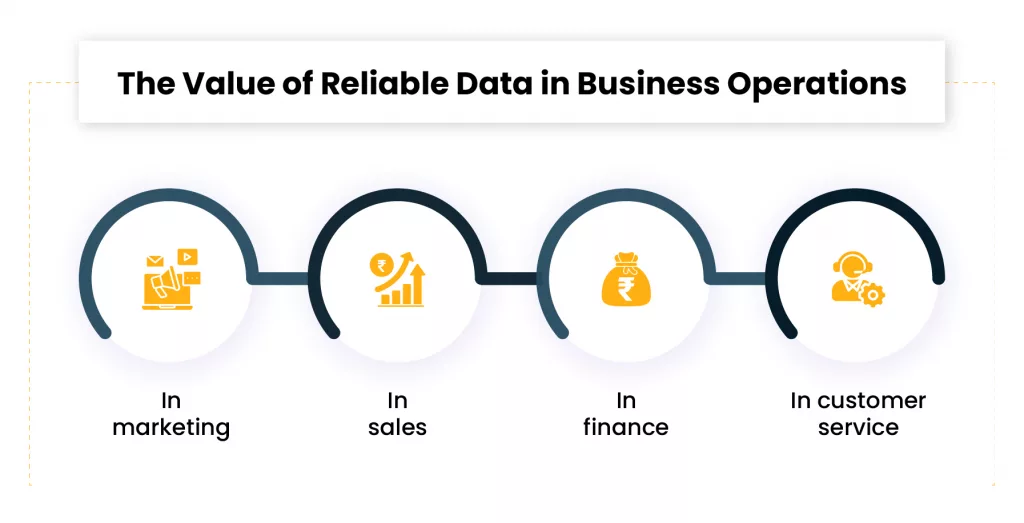Data is involved in nearly every task your business handles—from onboarding a new customer or closing a deal to running a weekly performance report. If that data is incomplete or outdated, you end up with wrong results and missed opportunities.
This isn’t only a technical issue. It also affects the following:
- How well do your teams work together?
- How do customers experience your brand?
- How confident leadership is in decision-making?
Businesses that wish to develop without encountering additional hurdles must start with clean, accurate, and reliable data.
That is what data quality management is all about: bringing your data to a point where it benefits the business rather than hinders it.
What Makes Data “High Quality”?
High-quality data has five key traits:
- Accuracy – Is the data correct and up to date?
- Completeness – Are there any missing fields or details?
- Consistency – Is the same data shown the same way across different systems?
- Uniqueness – Is there duplication?
- Timeliness – How fresh or recent is the data?
When data ticks all these boxes, you can rely on it. You can trust the reports, campaigns, and strategies that are built on it.
Data Problems Cost More Than You Think
Start your journey toward cleaner, more reliable enterprise data with Cygnet.One’s Data Quality Management services—designed to improve accuracy, trust, and outcomes.
Contact UsWhy Businesses Can’t Ignore Data Quality
No matter what size your company is, data is part of your everyday work. You use it for reports, campaigns, forecasts, transactions, and customer communication. If your data is wrong, outdated, or inconsistent, it slows everything down and damages trust—both inside and outside the company.
According to Gartner’s, companies lose an average of $12.9 million annually as a result of poor data quality.
When data issues pile up, they cause:
- Missed sales opportunities
- Unhappy customers
- Wasted marketing spend
- Inaccurate performance tracking
- Compliance issues with data privacy rules
The more systems you use, the bigger the risk if your data isn’t being checked regularly.
What Is Data Quality Management?
Data quality management means checking, fixing, and maintaining your business data so that it stays accurate, complete, and ready to use. It involves setting standards, tracking issues, and using tools or workflows that prevent bad data from entering your systems.
The process usually covers:
- Removing duplicates
- Correcting incorrect values
- Completing missing data
- Standardizing formats
- Updating old records
Without this type of management, your data will get messier over time, which creates bigger problems down the track.
The Value of Reliable Data in Business Operations

Let’s take a closer look at how proper data quality management supports everyday work:
- In marketing
You avoid targeting the wrong audience or sending the same email to the same person multiple times.
- In sales
Your CRM is cleaner, with more complete customer records and more accurate lead data.
- In finance
You get more trustworthy revenue reports and forecasts.
- In customer service
You access a full and correct view of each customer’s interactions and history.
Every team performs better when the data they rely on is solid. And when those teams trust the data, they’re quicker to act, more confident in their work, and less likely to waste time checking and fixing things manually.
Choosing Data Quality Management Solutions
If you’re thinking about getting help with your data, there are data quality management solutions built for businesses like yours. These systems handle large amounts of information and help you find and fix issues before they cause damage.
The best ones usually offer:
- Easy ways to check data for accuracy
- Rules you can set based on how your business operates
- Integration with your CRM, ERP, or marketing platform
- Reports showing where problems are coming from
- Support for different types of data (e.g., customer, product, sales, etc.)
You don’t need to start with a huge setup. Many solutions can be rolled out gradually—starting with the areas where data problems are hurting your business most.
What to Look for in a Data Quality Management Solution
If you’re considering using data quality management solutions, here’s what to check for:
- Can it connect with your current systems like CRMs or ERPs?
- Does it let you set custom rules based on your needs?
- Is it easy for non-technical staff to use?
- Does it support both ongoing checks and one-time cleanups?
- Can it scale as your data grows?
When Should a Company Take Action?
If you’re unsure whether this is something you need to deal with now, ask yourself these questions:
- Are your teams double-checking data before making decisions?
- Do you regularly find incorrect contact info or order details?
- Are your reports showing inconsistent numbers across departments?
- Are customers getting wrong or outdated messages?
If the answer is yes to any of these, your business is likely being held back by poor data. Waiting will only increase the cost and complexity of fixing it later.
What Are the Benefits of Taking Data Seriously?
Fixing your data quality is not just a technical move. It directly affects how well your company functions. Here are a few common results businesses report after setting up proper data quality management:
- Shorter time spent on data cleanup and manual checks
- Faster sales cycles due to better lead information
- Higher engagement from marketing emails
- Increased confidence in business reports
- Fewer customer complaints about incorrect info
Beyond financial implications, poor data quality erodes trust within organizations. A significant 80% of business executives surveyed by IBM reported a lack of trust in their organization’s data. This distrust can hinder effective decision-making and strategic planning.
The fix isn’t just about software. It’s about getting ahead of problems and working smarter.
Don’t wait until data chaos slows you down.
Partner with Cygnet.One to implement a scalable, results-driven Data Quality Management framework.
Get Started TodayData Quality Management Best Practices
Once you’re ready to take charge of your data, here are three essential data quality management best practices to follow:
1. Set clear goals
Decide which areas of the business need clean data first—sales, marketing, finance, or operations. Work from there.
2. Assign ownership
Make sure someone is responsible for monitoring and maintaining data quality in each department. It shouldn’t fall on IT alone.
3. Review and update regularly
Create a schedule to review your data for accuracy and run updates or cleanups. Data changes fast, so regular check-ins are key.
Following these steps can help you build strong habits and make your efforts more effective.
Why Now Is the Right Time?
As more companies switch to digital tools and rely on automation, the amount of data keeps growing. If that growth isn’t managed, it turns into a mess that’s hard to fix.
A clear data quality management plan helps your business stay organized. It makes your tools more useful, your staff more productive, and your decisions more accurate.
Waiting too long can make it harder to track down issues and clean them up. That’s why many companies are now investing in data quality management solutions before problems start piling up.
Connect with us to manage your data correctly!










